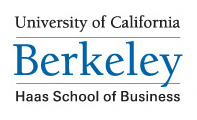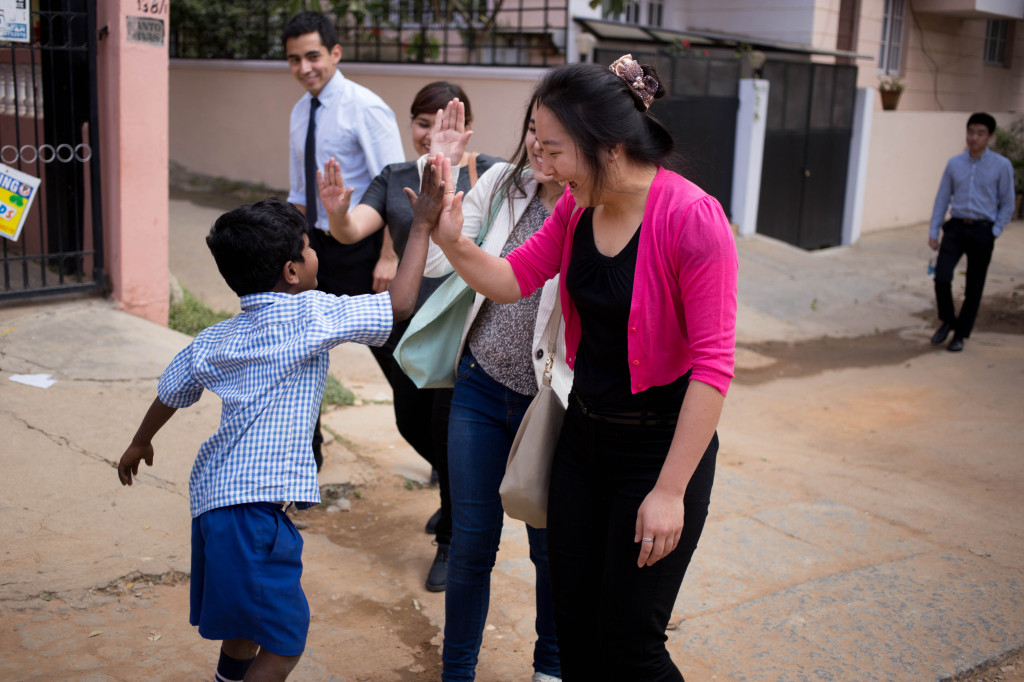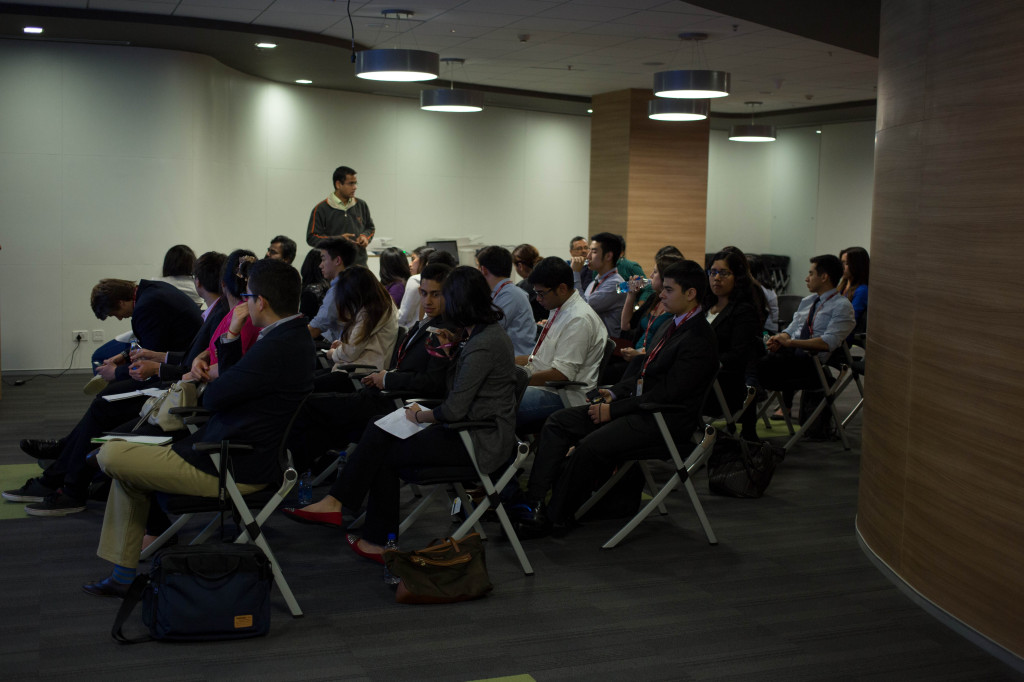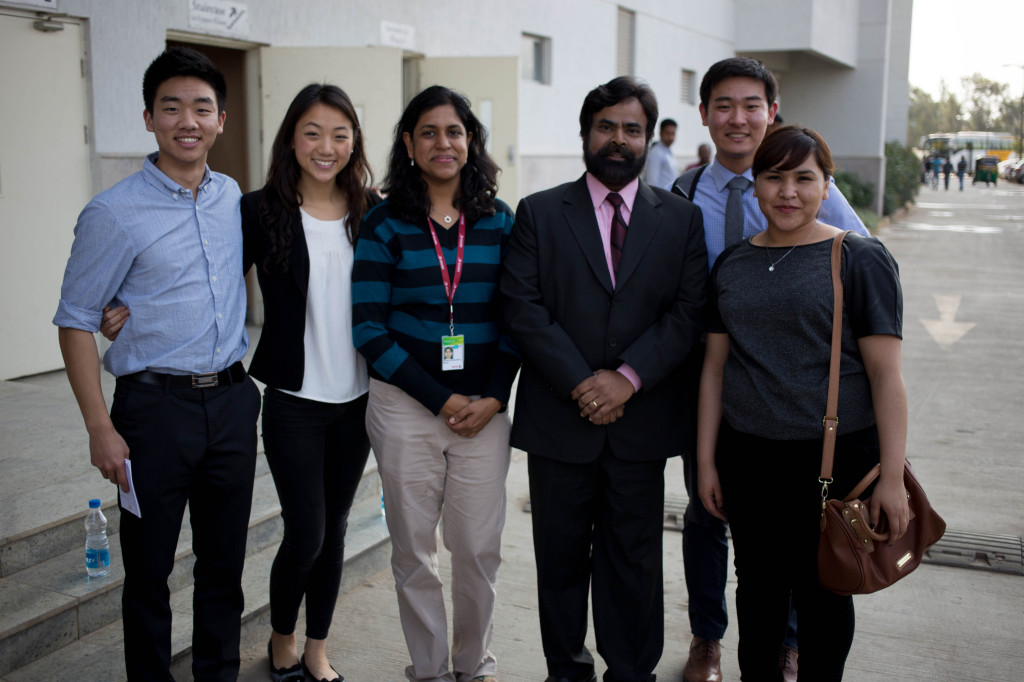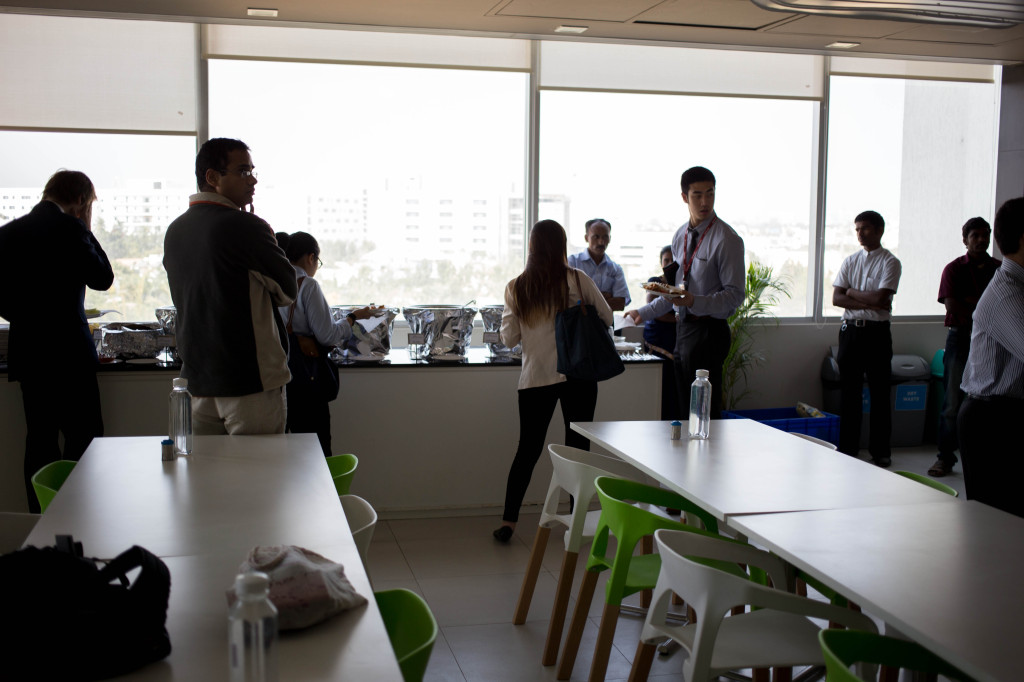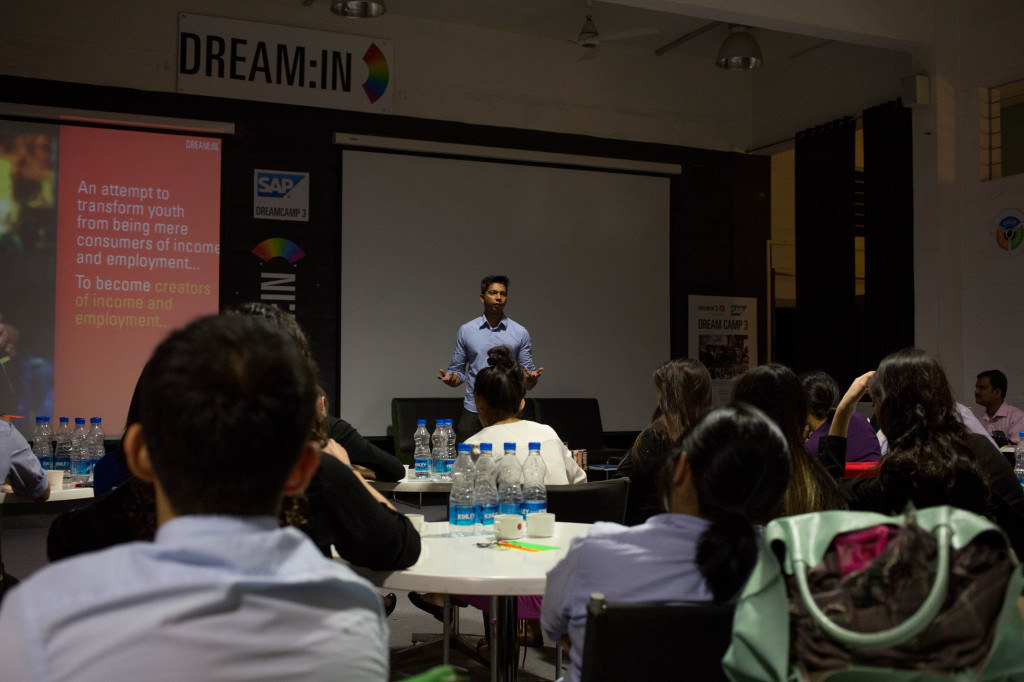Overview of India
Nowadays, developing global mindsets is extremely important to gain a competitive edge in business and politics. Due to technological progress, connecting and transacting business with each other has become immensely convenient. It is also this convenience that makes succeeding or failing ventures so easy depending on one’s cultural familiarity. This is even more true when entering emerging markets, whose common behaviors, beliefs, and practices are very distinct from those of the west.
That being said, before venturing into the day’s planned corporate visits at Xerox and IDIOM, Professor Darwin deemed it necessary that students first become acquainted with the political, social, and economic background of India. To do so, he invited Haas Alum (MBA 1995) and General Manager of Citrix India, Mr. Rakesh Singh to give students an overview of India’s current business and socioeconomic landscape. Singh welcomed the students on behalf of Haas Alumni Network in Bangalore.
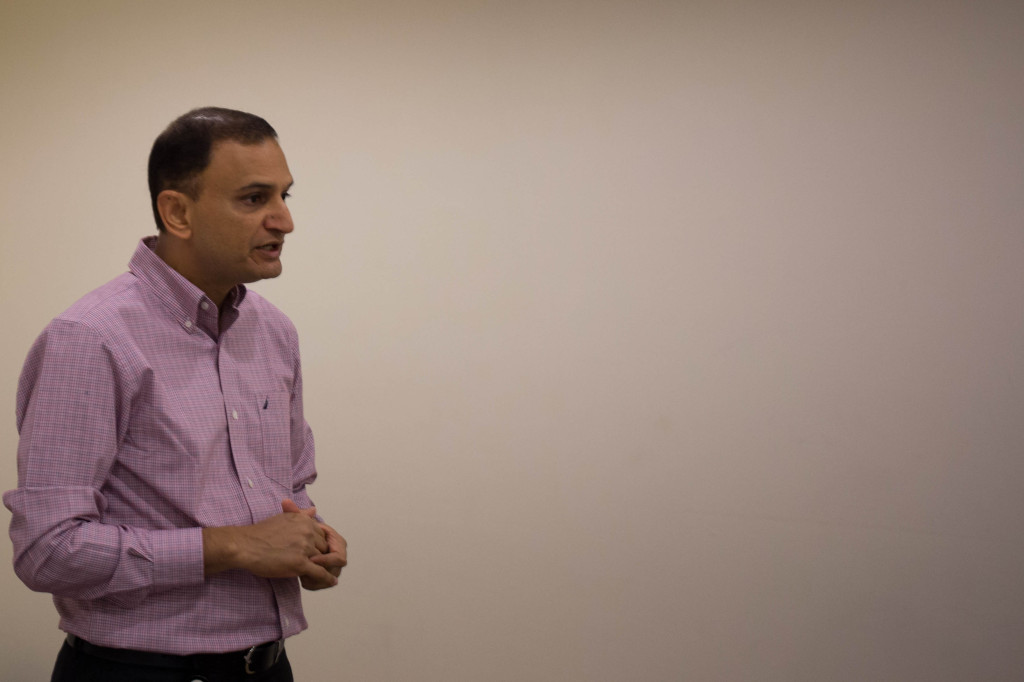
Haas alum, Rakesh Singh, speaks to students about India’s current business, economic, and political landscape.
Singh spoke briefly about Bangalore’s current position in the realm of corporate innovation in today’s era of business. According to the Haas alum, there are currently multiple transitions transpiring in India right now, like the ones going on in the sphere of education to power and deploying real change in government systems and business models. He recognizes Bangalore’s IT know-how as one of the key instigators of such change. There are over 800 companies booming in the city’s IT industry right now.
He provided examples to support his statements of important transitions going on in India right now: In education, the Indian people, the young adults especially, are increasingly becoming more aware and convinced of the significance of literacy. Innovations in technology such as the Internet and other forms of media have also made corruption less difficult to track, causing the Indian population to mobilize and create new political parties to produce real change.
One of the most unprecedented occurrences in Indian politics is the election of a young politician into high office in New Delhi six months ago. In the past, politics was mostly controlled by the older generation. Whereas today, it has become possible for aspiring young candidates to climb the political ladder much quickly, due to the transparency and enhanced education brought to the Indians by technological innovations. Having the knowledge to assess fraud and character, voters are more aware of the situation and therefore better informed to make good election decisions.
Singh’s talk enlightened students and reaffirmed them of the huge role that innovation plays in all aspects of India’s progress and the Indian markets.
Xerox Visit
Xerox is the world’s leading enterprise for business process and document management. It has a presence in more than 160 countries and has over 140,000 employees worldwide.
Innovation is and has always been an important and integral part of Xerox’s business operations. The company spends approximately $1.5B per annum on R&D in five of their research centers around the globe. Xerox also has around 10,000 active patents with twenty new incoming patents a week from the U.S.. Despite its huge R&D budget however, Xerox is focusing on a business innovation model that is geared towards jugaad or frugal innovation; which means innovating out of necessity in the most efficient and least costly ways possible.
Students were told that a company can eventually innovate frugally after having ample market expansion, utilizing outcome based services (commission percentage model versus fixed salary model), and pursuing constant innovations until the firm successfully tackles and overcomes unique challenges that are specific to its specific geographic location.
Xerox is currently implementing this technique into areas, namely Transportation and Healthcare. Private transportation in big cities can be pretty difficult, especially when parking is such a huge problem. Researchers reported that 25% of all driving time was spent on finding parking space. Consequently, Xerox developed innovative pricing algorithms to automatically increase rates for in-demand parking spots, and vice versa for less contended areas.
Xerox recommended and implemented this process in Los Angeles, known as the LA ExpressPark. As early as the first six months of trial, parking congestion already decreased by 10%, with spaces much easier to find; under-utilized parking spaces decreased 5% because drivers were drawn by the lower prices; and pilot-wide parking rates decreased by 11%, while LA’s parking revenue increased by 2%. Traffic rates continued to decrease exponentially after LA ExpressPark’s pilot.
In healthcare, researchers discovered that cameras can actually penetrate skin with visible and infrared light while being safe and environmentally friendly. This technology can be useful for analyzing babies, because methods that require physical contact may be harmful to a newborn’s skin; causing the skin to potentially torn in the process. The technology is currently very expensive and still not commonly used. Nonetheless, Xerox is hopeful of its more wide-scale usefulness in the future, due to the benefits that it can bring to human health and the environment.
In closing, Xerox believes that open innovation gave and continues to give them an edge in the industry. Banking, for example, is really problematic in India, simply because of the unorganized business models, cultural taboos, and misunderstandings on the customer side. Consumers often do not know enough about the banking process, which leads to wrong decisions and dissonance. In response, Xerox developed a more open business model that included rural areas; creating a more effective distribution channel and helping the company better manage customer relationships through reduction of miscommunication risks and data corruption. With the new model, Xerox was also able to lower cost of opening a bank account by 50 times, as well as cut waiting time from three days to only 10-30 minutes.
IDIOM Visit
IDIOM is a design and consulting firm based in India that incubates business ideas, ideas for societal transformation and ideas on life and living.
At IDIOM, they introduced a startup program called DREAM:IN. DREAM:IN is relatively new, it emerged as a project in early 2011 and as an organisation in mid 2012. It is a for-profit, sustainable enterprise that helps people innovate themselves based on their dreams and goals in life. The founders of DREAM:IN saw that many Indians knew how to take advantage of circumstances, but only a few were able to maximize their opportunities. Thus, the company teaches people ways to better use the assets that are at their disposal. Nonetheless, IDIOM’s target audience is really everyone as their aim is to get people to Wake up and start Dreaming.
DREAM:IN’s target participants are the less educated; hoping to make a difference in their lives through mentorship and innovation. DREAM:IN is also very proud of their website, which includes a social networking feature where dreamers can post a dream and mentors or supporters can “believe” in a dream, very similar to Facebook’s “like” system. DREAM:IN is mobilizing young people to innovate and create new jobs through entrepreneurship.
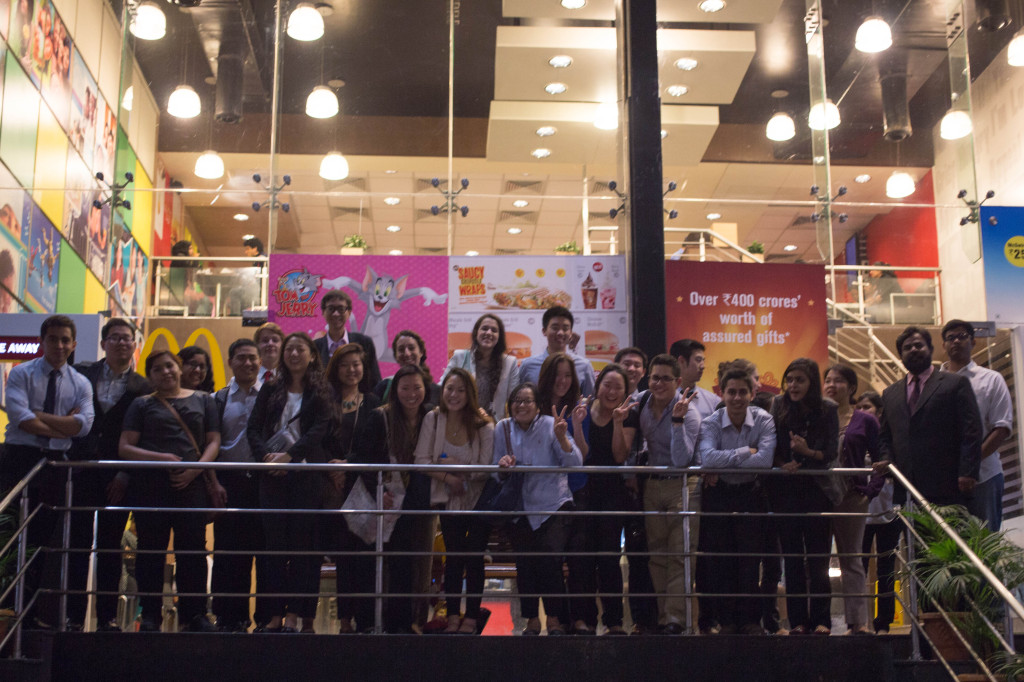
McDonalds
In conclusion, both companies exhibited very frugal and exciting forms of innovation. Students challenged themselves and their hosts with tough questions and received great answers. As the day was drawing to a close, the students decided to try Bangalore’s McDonald’s just to have American food to wrap up the night!
